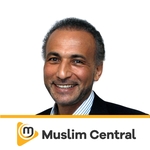Tariq Ramadan – Chronicles of Ramadan #02 To be

AI: Summary ©
The speaker discusses the importance of self-reflection and self-reflection to deal with one's own self and past failures. They emphasize the need to be aware of one's own limitations and acknowledge the weight of one's life. The speaker also emphasizes the importance of rebuilding one's relationship with God and rebuilding one's relationship with oneself.
AI: Summary ©
Peace be with you.
We talked yesterday
about this,
notion
of repair,
what we need to understand when it comes
to our own self. When we got
and we get this consciousness
with our own heart, with our own destiny,
with our own relationship to God and relationship
to ourself.
And at that point, we understand that, yes,
yesterday, we were
an innocent baby, and with time, things are
changing. And with our consciousness,
we understand that we have to deal with
our own self, and it's not always easy
to deal with our,
weaknesses, to deal with our,
failures,
with our
setbacks, and even with our mistakes
during our life.
And the point is that when we deal
with
many of the scholars and the olema, when
we are talking to them,
they are right with one thing. They are
telling us this is the way. This is
where you have to go, and this is
what you have to do. You have to
pray. You have to fast. You have to
give zakat
and so on and so forth. We know
that we have to do all this. The
point here, and this is what is missing
very often in the spiritual discourses that we
have,
is not only to know where we have
to go, because this could be obvious,
but what are we bearing?
What is the burden that is on our
shoulders, and in which way we have to
deal
with it, and no one on earth can
know it except God
and yourself.
Because this is
something that you have to deal, and you
have it in the Quran when you have
to come. And and when the the weight
are going to be heavy,
they are going to be light. This is
what we have to deal with during our
life. So, yes,
know
the way,
know
where we you are heading, but know also
what we you are holding,
what you are bearing in your heart and
in your life. Meaning that
you have to deal with your relationship with
god, but your relationship with your parents,
the legacy that you are,
holding, the legacy that you are,
bearing, the legacy that is,
in fact, educating you and helping you and
sometimes being a herder, being an obstacle in
the way you are going to deal with,
the Islamic principles and with your own faith.
So
when you deal with this, you understand that,
as I said, life is a pilgrimage. And
during this pilgrimage, you come back to yourself.
And with this awareness, this consciousness,
you are dealing with yourself and you know,
okay.
This is where I have to go. I
know that god is expecting from me to
follow this path, but at the same times,
he's expecting
from me. If I want to deal with,
the principles,
if I want to be faithful to the
rituals, if I want to
be an a man or woman of faith,
I have to deal with
everything
which is an
obstacle between me
and
my heart,
me and the purity
of my life. And at one point,
if you know where you are heading,
you should start
to be,
aware,
to be and to have this kind of
lucidity
with your own
personal,
intimacy, your own heart in order to repair
what should be repaired and fixed
today, tomorrow,
and for the time to come. Don't forget
to tell the people you love that you
love them. Life is fragile.